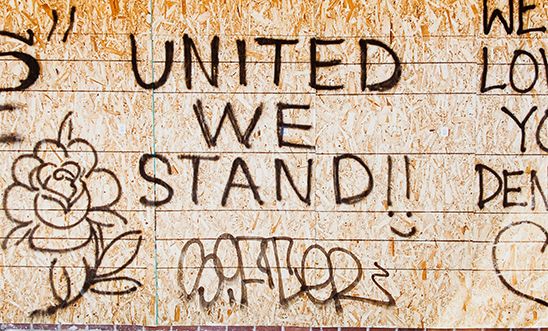
Why COVID-19 is far from an equaliser

by Shoomi Chowdhury - Human Rights Education Officer at Amnesty International UK
The British Medical Association called on the government to urgently investigate if and why black, Asian and minority ethnic people are more vulnerable to COVID-19, following reports that the first 10 doctors in the UK that died from the virus were all BAME (black, Asian, and minority ethnic).
'We have heard the virus does not discriminate between individuals but there’s no doubt there appears to be a manifest disproportionate severity of infection in BAME people and doctors. This has to be addressed – the government must act now.' – Dr Chaand Nagpaul, British Medical Association
The impact of COVID-19 has hit every British household, but its impact is far from an equaliser. This crisis is hitting an already unequal society.
Work, poverty and immigration laws mean coronavirus hits BAME communities hardest
Over a third of all patients critically ill with COVID-19 were from Black, Asian and Minority Ethnic (BAME) backgrounds – despite making up just 13% of the UK population.
Not only are BAME communities disproportionately impacted by health inequalities, the economic impact is likely to hit them harder too, with rates of poverty in BAME communities being twice that of their white counterparts.
Intersectional solutions needed to bridge the divide
As we look further into this issue we find that an intersectional approach is key to how we approach this crisis and how we approach human rights issues in general.
We know that health and economic inequalities impact those on low incomes and minority communities the most, but there’s an even higher risk of exposure if you’re a woman and BAMEi. These are the people who make up a higher proportion of frontline healthcare workers tackling this pandemic – both around the world and in the UK.
This pandemic is hitting us hard but some harder than others.
The fight for human rights never stops and for us all to live lives with dignity, fairness and justice – as the Universal Declaration of Human Rights intends – we have to be more mindful of how our lives differ.
Four leading intersectional thinkers on why an intersectional approach makes us more effective
1. 'There is no such thing as a single-issue struggle because we do not live single-issue lives' – Audre Lorde
Intersectionality is not about who has it worse. It's about how different oppressions interlink. This pandemic is bringing to our attention an array of issues from safety, childcare, working patterns and resourcing that cannot be tackled in isolation of each other.
We have even seen how this lockdown has created new problems such as childcare provisions for key workers and the alarming increase in calls received by domestic abuse helplines.
2. 'Being oppressed means the absence of choices' – bell hooks
COVID-19 restrictions on how we work, live and travel have highlighted where privilege and power lives in our society. What choice do you have to self-isolate at home if your living situation is overcrowded, or if you have no home at all? How limited are your choices when you’re incarcerated or compelled to work because working from home isn’t an option and not working means not eatingii?
3. 'If we aren't intersectional, some of us, the most vulnerable, are going to fall through the cracks.' – Kimberlé Williams Crenshaw
In recent weeks we have seen how much this country is now relying on key workers not just in the NHS, but in our supermarkets, care sector and cleaning services. Many of these roles have the least protections, whether that’s zero hours contracts, agency contracts or being paid below living wage. The overrepresentation of BAME people and women in these roles demonstrate the vulnerable position, in particular BAME women, face.
What is clear is that we cannot go back to the way things were.
Three weeks ago we were told those working in supermarkets, social care & cleaners were 'low skilled' - now these are the people crucial to managing #COVID19 outbreak. Everyone plays their part in society - these workers deserve decent wages and sick pay. Not just now, but always.
— Faiza Shaheen (@faizashaheen) March 16, 2020
4. 'Solidarity involves commitment, and work, as well as the recognition' – Sara Ahmed
Sara Ahmed’s full quote reads; 'solidarity does not assume that our struggles are the same struggles, or that our pain is the same pain, or that our hope is for the same future. Solidarity involves commitment, and work, as well as the recognition that even if we do not have the same feelings, or the same lives, or the same bodies, we do live on common ground.'
Solidarity forms a fundamental part of our Amnesty movement. Taking intersectionality into account, requires our solidarity to be meaningful, embodied in accountability, self-reflection and recognition. It isn’t just what we do but how we do it. Meaningful solidarity explores our own power and privilege. It leads to changes in our behaviour and in our communities. An intersectional approach calls for the protection of the vulnerable.
The people falling through the cracks are being hit the hardest and have to be our priority – because none of us are truly safe until we're all safe.
Help protect our rights during the COVID-19 pandemic by donating to Amnesty today. Thank you.